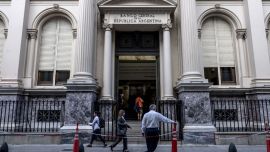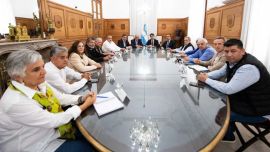The resignation of Supreme Court Justice Elena Highton de Nolasco generated surprise within the government. Although some in the Casa Rosada disagreed with the magistrate’s decision to continue in her position beyond the age of 75, thanks to a special judicial ruling, her resignation had not been contemplated in the short term, and now the government must decide on a name and propose it – all amid the pressures of election time.
In less than a month, the Supreme Court will provisionally be made up by four members, all men. The new vacancy opens a window of opportunity for the national government to propose a name that will occupy the available seat.
However, the issue will be a huge challenge for the ruling coalition. It not only implies the reaching of an agreement within Frente de Todos, but winning the support of the opposition. What in theory seems easy, in practice is complicated.
At Balcarce 50, the hope is that events will follow the same path as their push to install Federal Judge Daniel Rafecas as attorney general. He won support not only within the ruling coalition, but from the opposition too.
Move quickly
The news from the court forced the government to act quickly. Judicial sources within the ruling coalition, when consulted, remained unclear as to who could be the next justice.
“I don't see who it can be, we are still trying to see what names can be included in the dance,” said one well-placed Kirchnerite source.
The first thing is to define names. For this, the interaction between ‘el albertismo y el kirchnerismo’ will be key. Both sides must now evaluate who is the most appropriate and convenient person to propose – all while the ruling coalition is in disarray after its heavy defeat in September’s PASO primaries.
There is a clear constitutional path ahead: to successfully elect a member of the nation's highest tribunal, the Senate has to support the candidacy proposed by the president with at least two-thirds of its members.
In the middle of an election year, the government will have to hurry if its nomination is to win the necessary votes to advance. The conditions are adverse. Out of 72 senators, the Frente de Todos has 41 and would need the support of at least seven senators from the opposition and other spaces to clinch the vote.
The need becomes even more urgent if the upcoming elections are taken into account. If the results seen in September were repeated, the ruling coalition would lose five or six seats, with the opposition spanning up five of them to improve its own tally.
The numbers are missing – and time is short.





















Comments